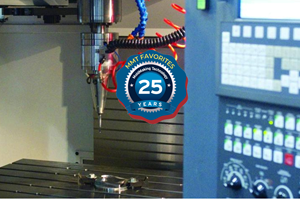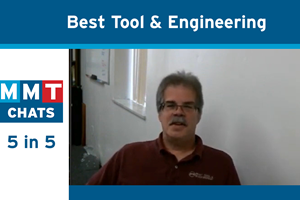Release the Entire Potential of Your Machine Tool Investment
Making tooling a part of your machine tool purchase via a tooling certificate can save you time and money.
During the machine tool purchase process, tooling is an often-overlooked piece of the puzzle; however, by thinking about the tooling right from the start, shops can cut machine tool payback time by as much as an entire year. And by reducing payback time, they can also reduce the time it takes for a new machine to start making their businesses more profitable.
Tooling certificates make early tooling planning easier and more productive. Starting early in the process, the company works with the machine tool distributor to integrate a tooling package into the machine purchase. After the distributor orders the tooling certificate for the customer, tooling company representatives visit the shop to choose, order and install the tooling products best suited for the application.
There are immediate benefits to this integration. If a buyer implements a tooling certificate right at the start, he or she has the right to potentially use it as a tax write-off or a justification. Also, with a tooling certificate partnership in place, the machine arrives, the tooling arrives and the customer is ready to go. Nobody is scrambling to collect old tools that will work until the new tooling gets ordered and delivered. It’s a much more seamless process.
In addition to reducing run-off complications and offering potential tax benefits, wrapping tooling and accessories into the machine purchase makes for more streamlined financing and budgeting. Tooling certificates help machine tool partners and distributors provide added value for their customers, while easing the burden of intensive engineering and application support.
If a company were to spec out every tool and assembly after a big turnkey purchase, it would have to assign an engineer to that task for months at a time. Tooling providers can act as partners to take the load off the existing engineers, enabling them to concentrate on more machine-tool-specific concerns such as programming, fixturing, location and robots.
Flexibility is another benefit of integrating tooling purchases. The distributor can order the machine, get it spec-ed and order the tooling certificate without having to spec exactly what tool the company plans to purchase at that particular moment. As machine delivery nears and the shop decides on tooling, the distributor can start ordering based on that new information.
A common misconception is that company size is a deterrent to pursuing tooling certificates. Regardless of headcount, budget or square footage, pressures are likely the same: lower costs, global competition, reduced leadtimes, and evermore complex designs and exotic materials. And, above all, the company has to deal with the challenge of maintaining a competitive edge and generating the fastest possible return on its investment. A tooling certificate is aimed at alleviating all of these stresses.
By looking at the real numbers, a shop will quickly see a whole new world of opportunities. On the surface, tooling accounts for a mere 3 percent of total production costs; however, there is a more important set of numbers. Expert tooling can provide the power to run a machine to its full potential and beyond. Custom-matched cutting for specific operations can increase cutting data by as much as 20 percent. This can mean a full 15-percent reduction in total component costs.
The math adds up: Making tooling a part of your machine tool purchase via a tooling certificate can save you time and money.
Related Content
Machine Hammer Peening Automates Mold Polishing
A polishing automation solution eliminates hand work, accelerates milling operations and controls surface geometries.
Read MoreExploring ISO 9000 - Part 16 Control of Quality Records
A Series of International Standards for Quality Management and Quality Assurance. We begin 2022 with a review of Clause 4.16 Control of Quality Records.
Read MoreHands-on Workshop Teaches Mold Maintenance Process
Intensive workshop teaches the process of mold maintenance to help put an end to the firefighting culture of many toolrooms.
Read MoreMMT Chats: 5 in 5 with Best Tool and Engineering
MoldMaking Technology Editorial Director Christina Fuges reveals 5 best practices for improving efficiencies within shops...in 5 minutes. Our guest is Joe Cherluck, President of Best Tool and Engineering in Clinton Township, Michigan. This episode is brought to you by ISCAR.
Read MoreRead Next
Are You a Moldmaker Considering 3D Printing? Consider the 3D Printing Workshop at NPE2024
Presentations will cover 3D printing for mold tooling, material innovation, product development, bridge production and full-scale, high-volume additive manufacturing.
Read MoreHow to Use Strategic Planning Tools, Data to Manage the Human Side of Business
Q&A with Marion Wells, MMT EAB member and founder of Human Asset Management.
Read MoreReasons to Use Fiber Lasers for Mold Cleaning
Fiber lasers offer a simplicity, speed, control and portability, minimizing mold cleaning risks.
Read More
















.jpg;maxWidth=300;quality=90)







